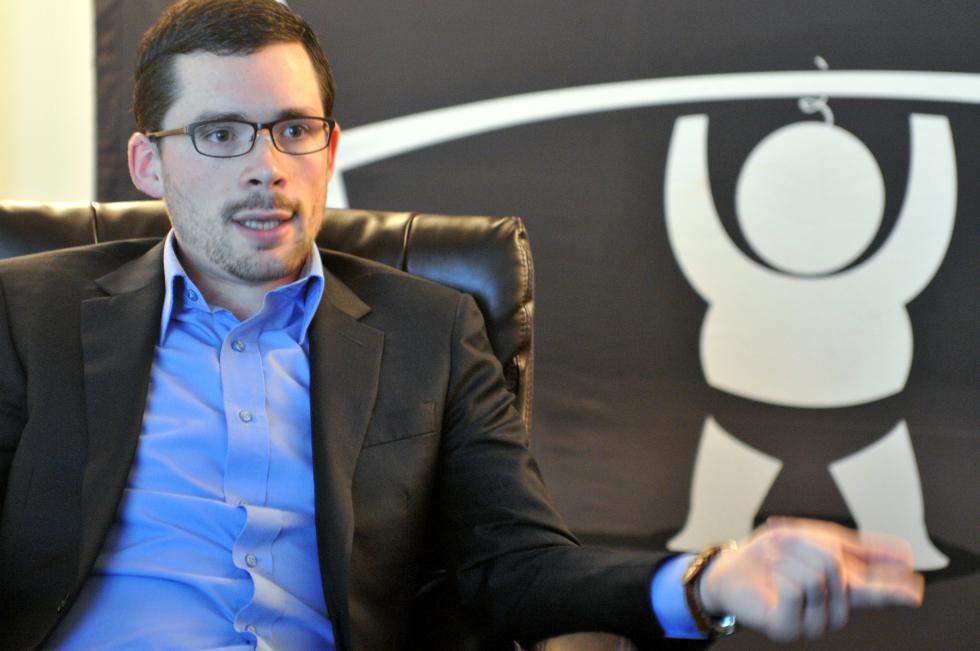Places like San Francisco, Seattle, and Boston are established hubs of tech giants and start-up companies. A growing number of smaller cities and regions want a piece of the action, including the Pioneer Valley. A Springfield-based organization called Tech Foundry has an ambitious mission: to “turn western Massachusetts into the technology capital of the Northeast.” But how? I asked the creator of Tech Foundry, Delcie Bean.
“This is an area that could be thriving and succeeding, but when we looked at why it wasn’t, one of the critical pieces that’s missing is a skilled workforce, Bean says, “and it’s very hard to convince a company to locate here, or to re-locate here, or even to grow here without a strong, skilled workforce.”
So Bean wants to train high school students in coding and other computer skills. The organization started with 25 kids last summer. It’s housed in an office building in downtown Springfield in a space that mimics the trendy offices of tech companies like Google.
“You’ve got the ping-pong table, you’ve got the Wii that they can play with. So it gave them a chance to interact with each other, to bond, but also just to take a break and have fun.”
Tech Foundry students are also given professional clothes to wear at all times. And the organization provides meals to the students, many of whom come from lower-income families. Bean says the goal is to get the students jobs in IT at local companies, or into a community college program with the promise of a job later.
“In every case it’s a major step forward toward an IT career in the Valley,” Bean says.
There’s also that bigger goal for Delcie Bean – to build up a tech center in the Pioneer Valley, and attract major tech companies to Springfield. Bean himself owns an IT firm based in Hadley, and he has a software distribution startup called Waterdog based in Springfield. Separately, there’s a video game company that was recruited to the city from Amherst last year.
Bean says Springfield has the racial and ethnic diversity that many companies are looking for.
“If you look at 75 percent of the IT employees that exist in this country, they’re white males,” Bean says. “So oftentimes big tech companies have to open up offices in other markets in order to get that diversity.”
Another attraction: the relatively low cost of living, though that’s a benefit talked up by other small metro areas. Journalist James Fallows of The Atlantic has traveled around the country for the last two years looking at how cities are adapting to the modern economy. Fallows says the vision for Springfield and the Valley espoused by Delcie Bean has some traits of successful tech turnarounds he’s seen elsewhere.
“In almost every tale of urban redevelopment or tech sector spread, people will point back to a person or two or three people who said, ‘yeah, we’re going to make this happen,’ ” Fallows says.
The other essential ingredients are good vocational training programs, and a supportive local government, Fallows says. Springfield has that. The city’s Mayor, Domenic Sarno, is a big booster of redeveloping the downtown, and he’s visited Tech Foundry.
In another part of the Pioneer Valley, some of the big companies that Delcie Bean wants to attract were represented at a conference at UMass Amherst this spring. It was the launch of the school’s Big Data Center. Microsoft’s Jennifer Chays is based in Kendall Square – the tech hub in Cambridge. She says the company plans to give the school up to $500,000 worth of cloud computing resources per year.
“We’re very excited that UMass is training the next generation of data scientists, especially for Massachusetts,” Chays says.
But I asked Chays if Microsoft would locate jobs in this part of the state.
“At the moment, I don’t think we’re planning an R&D center in the Amherst area, but it’s not very far to Kendall Square,” Chays says.
Steve Vintner works for Google, and is UMass graduate. So what about you, Google? Any plans to open an office in western Mass.?
“I don’t think Google has any specific plans, but just in terms of seeing how this area has grown over the last twenty years, it’s phenomenal, so I think there’s going to be a bright future,” says Vintner.
Even if the efforts to bring Silicon Valley to the Pioneer Valley get more traction, journalist James Fallows says it takes some time to create a regional tech hub.
“You can think of the way that what we now call the Research Triangle of North Carolina, thirty years ago people said those terms with air quotes around them, now it’s a bonafide research triangle,” Fallows says. “The idea of having regional, non-big city tech hubs is consistent with what’s happened over the years.”
Delcie Bean says he’ll be ready to market the city and workforce of Springfield to big tech companies in less than two years. And he does already have the ping-pong table.
